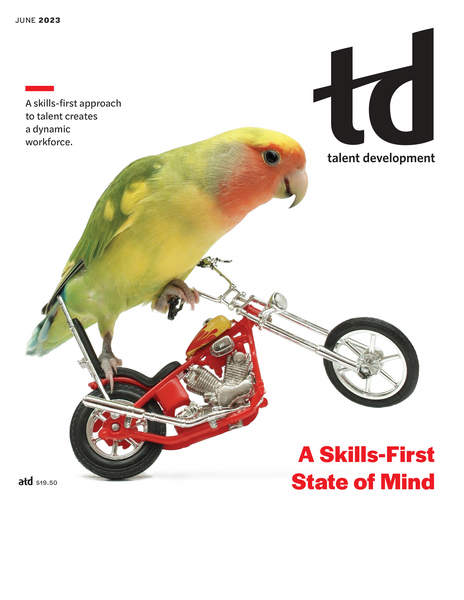TD Magazine Article
2023 Advancing Talent Development Award Winners
Profiles of the Advancing Talent Development Award winners.
Thu Jun 15 2023

Ready, Set, Automate
A program that is easy to apply, delivers quick victories for the company and its employees, and isn't expensive—that's a basic way to describe RPA Marathon, an initiative that earned Turkcell the 2023 Talent Development Innovation Award. The idea behind the initiative is for employees to suggest ways for the company to automate business processes, enabling staff to upskill on digitalization while becoming more productive in tandem with reducing costs.
Turkcell, a Turkish telecommunication and technology services provider, views robotic process automation (RPA) as one of the most important levers of the digital transformation journey. RPA mimics employee behavior to complete routine, repetitive, and predictable tasks. The company designed the RPA Marathon after discovering that many aspects of employees' workloads were repetitive, leading to boredom and unproductivity among workers. The initiative entails a full year of activity that includes ideathons, seminars, and hackathons.
"We, as Turkcell Academy, believe that all of our employees have potential and talents that are just waiting to be revealed and developed," says Tuana Begüm Akdemir, program manager of Turkcell Academy. "Our goal is to help our employees become aware of this potential and use it both to improve themselves and the company. In this context, we support our employees in realizing their potential with the systems and approaches we have developed to take their talent ... to the highest level."
The RPA Marathon launched in March 2022 with an ideathon, during which employees applied for the program with their concepts and built their teams. Turkcell Academy facilitated the teams with a design-thinking approach to enhance their ideas. The first ideathon garnered 65 ideas, and internal judges rated the submissions and announced winners.
After that, the training part of the marathon began, wherein employees learned how to further develop the winning ideas. The training program has several levels, including a four-hour online module on scenario writing in RPA Ghost, a Turkcell-developed software available internally and externally for RPA implementation and coding.
The second level of training is a two-day, in-class session where employees complete several RPA scenarios, after which internal technical experts mentor the participants regarding their automation projects. More than 700 employees participated in the in-class training during the program's first year.
The company then invited individuals who completed the program to participate in a 72-hour hackathon during which participants actualize the winning ideas. Last year, the company hosted two hackathons.
In total, 2,372 people have participated in at least one RPA Marathon event, thus taking part in upskilling and reskilling initiatives while exhibiting creativity and improving productivity. As a result of implementing the automation initiatives derived from the ideathon, Turkcell gained 11.1 million minutes (approximately 185,000 hours) in employee time from the RPA Marathon. As the company continues hosting marathons, it expects not only more automated processes, but the entire workforce to be equipped with the knowledge to use RPA technology as well.
"All our development programs are based on our leadership model, Turkcell Ecosystem Leadership, which embraces not only our leaders but also all of our employees," says Akdemir, because the company believes that each employee is a leader in their own right.
What Makes a Good Culture?
"Together We Create a World That Works Better." That is the Association for Talent Development's vision. One of the operative words is together. According to Merriam-Webster, to collaborate means "to work jointly with others or together especially in an intellectual endeavor," and culture is "the set of shared attitudes, values, goals, and practices that characterizes an institution or organization" (italics added). For work today, TD professionals must be adept at honing collaboration and culture.
Two awardees have extensive insights in that area. Kevin Oakes, author of Culture Renovation: 18 Leadership Actions to Build an Unshakeable Company and CEO of the Institute for Corporate Productivity (i4cp), is this year's winner of ATD's Thought Leader Award. Keynote speaker Erica Dhawan, a leading authority on collaboration and innovation as well as author of Digital Body Language: How to Build Trust and Connection, No Matter the Distance, is the recipient of the Talent Development Champion Award. ATD presents the latter to an individual outside the profession who advocates for TD.
High-performing organizations are six times more likely to have a healthy culture than low-performing organizations; the former accounted for 20 percent productivity gains since the start of the pandemic, Oakes shares, citing i4cp research. "The fittest cultures typically have more flexible work arrangements, boards that care about culture, and leaders who lead by example and regularly communicate values," he explains. "These cultures also typically are inclusive and collaborative while holding leaders accountable for employee development and movement."
To leverage connection to build culture, Dhawan suggests asking: "Are you providing a safe environment where employees can communicate their concerns and share their challenges? Are you building rapid connectivity with new hires? Do you welcome a diversity of perspectives? Do you encourage vulnerability as a strength?"
TD professionals can train leaders and teams to be successful in this new era, says Dhawan. The first way is to help teams align and communicate their needs. With changed schedules and commitments, it's important to "understand what those norms are and plan your teamwork around these commitments for both in-person and virtual work," she states.
"A team functions better when everyone supports each other. As leaders, owning the moment—whether it means acknowledging good work, saying thank you, being flexible for others, working together around inconveniences, and covering for others when they need it—will go a long way in building trust in your team," Dhawan adds.
In addition, TD professionals can help extend leadership traits to people leaders, says Oakes. "Help them lead in a new work environment that often isn't bound by time or place of work and instead is focused on workforce effectiveness."
Oakes also notes that, rather than trying to retain their culture in times of change, organizations can renovate. "That's what's key: not focusing on how to 'retain' your culture no matter what, but—like renovating an old house—how to keep what's unique and \[what\] is hard to replace while at the same time improving and changing as the times change in order to increase value."
Finding Value in Service and Thought Leadership
The talent development profession is filled with individuals who want to make a difference. "The key for me was to choose organizations with which I could have long-term relationships," explains Hadiya Nuriddin, recipient of this year's Talent Development Outstanding Professional Award. The award recognizes individuals who demonstrate exceptional TD expertise, leadership, and service.
Nuriddin says that to cultivate relationships with organizations, "I had to be consistent in when and how I showed up. ... It takes some self-awareness and trial and error to figure out what works for you." She found that volunteering for events with start and end dates worked for her because she could choose to participate annually depending on her schedule.
In addition to being CEO and chief learning strategist at Duets Learning, Nuriddin is the author of StoryTraining: Selecting and Shaping Stories That Connect, two TD at Work guides, and many articles. She often marries her yen for giving back with professional and personal development, saying she learns a great deal through her writing and teaching.
"Many people are hesitant to write because they believe they need the expertise first so that the content will just flow out of their heads onto the paper, but that's not necessarily the case," Nuriddin shares. You need a level of understanding to ask the right questions, but you also learn during the process, she notes.
The award, introduced in 2022, also acknowledges leadership. You don't make yourself a leader, Nuriddin says. "People make you one by following you." You can then work to make your contribution more valuable. "Note that I didn't say by 'giving more'—I don't think it's about just giving people information. It's about releasing the type of content that encourages people to reflect on their own experiences and make sense of their own journey."
Leadership Isn't About a Title
Christian Furler O'Brien joined Bristol Myers Squibb (BMS), a global biopharmaceutical company, in 2020 as senior manager of US oncology training and talent development. His hire quickly proved beneficial for BMS; he led the sales training strategy for two key launches. Furler O'Brien, recipient of ATD's 2023 One to Watch Award, also leads recruitment efforts for the US oncology team and leads the company's LGBTQ+ Pride Month programming and celebrations.
"There are a few things that have helped me succeed in my career: taking initiative, empowering others, and leading with compassion," he says. "I love collaborating with others on new projects and sparking rich conversations to improve outcomes."
Furler O'Brien has since been promoted to associate director of training and talent development, leading a team of training managers responsible for developing and executing learning strategies.
Leading isn't anything new for Furler O'Brien, however. He's passionate about creating a culture of inclusion, which has led to him volunteering and advocating for nationwide LGBTQ+ organizations. "Additionally, a major source of strength for me has been owning my identity as an out and proud gay man and harnessing it to be a change agent in the workforce," he shares. "I have been involved in LGBTQ+ causes throughout my entire professional career."
Furler O'Brien says one of his proudest professional achievements is establishing an employee resource group for LGBTQ+ employees and their allies because it emphasizes what leadership is all about to him.
"I want people to understand that leadership does not happen because you have a title or specific role," Furler O'Brien explains. "We can all be leaders if we understand our purpose, recognize when more needs to be done, and work in earnest to improve the lives of everyone around us. Leadership skills are life skills; the ability to connect people within your care to a bigger purpose is powerful and inspires positive change."
You've Reached ATD Member-only Content
Become an ATD member to continue
Already a member?Sign In

